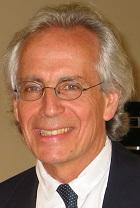Stanley Osher, UCLA professor of mathematics and director of applied mathematics, is the third person ever to be awarded the prestigious Gauss Prize, the highest honor in applied mathematics.
A UCLA professor since 1977, Osher received the award Wednesday morning local time during the opening ceremony of the International Congress of Mathematicians in Seoul, South Korea. The prize, named for 19th century mathematician Carl Friedrich Gauss, was first awarded at the 2006 congress. (The event is held every four years.)
The citation honoring Osher said he has made “influential contributions to several fields in applied mathematics and his far-ranging inventions have changed our conception of physical, perceptual, and mathematical concepts, giving us new tools to apprehend the world.”
Osher has collaborated with colleagues in a wide range of fields and the mathematical techniques he has pioneered have been highly influential. The results of his research have improved MRI scans and medical image analysis, advanced computer chip design, helped law enforcement agencies combat crime, enhanced computer vision, provided new ways to forecast weather and identify the source of earthquakes, and even revolutionized computer modeling for the design of supersonic jets.
“I am truly honored to have been awarded the third Carl Friedrich Gauss prize,” Osher said. “The previous winners were two of my scientific heroes. I am grateful to the UCLA administration and to my colleagues in the mathematics department for their support in building up applied mathematics, and to many of many colleagues outside of the department for the incredibly pleasant interdisciplinary research atmosphere that exists here.
“I’d also like to thank my sister, Sondra Jaffe, for convincing me that we could both join the middle class by becoming mathematicians in the post-Sputnik era.”
Osher has created innovative numerical methods to solve partial differential equations, and analyzed algorithms and their underlying partial differential equations. He also produced a new method for accurately describing how objects change shapes — predicting how, for example, a drop of oil floating in water will morph based on currents in the water, including what would happen if the drop of oil divided in two or merged with another drop of oil.
“Stan Osher is a superb applied mathematician who has made major advances in the solution of important real-world problems,” said Joseph Rudnick, senior dean of the UCLA College and dean of physical sciences. “His work is marked by elegance and efficiency. He richly deserves this important honor.”
The recipient of many previous awards, Osher was elected in 2005 to the National Academy of Sciences, and in 2009 to the American Academy of Arts and Sciences. He has been an Alfred P. Sloan Fellow and a Fulbright Fellow, and was selected to give a plenary address at the 2010 International Conference of Mathematicians and the John von Neumann Lecture at the 2013 meeting of the Society for Industrial and Applied Mathematics.
Osher was among the top 1 percent of the most frequently cited scholars in both mathematics and computer science between 2002 and 2012. His research was the subject of three-day “Osher Fests” at UCLA in 2002 and 2012.
He also the director of special projects at UCLA’s NSF-funded Institute for Pure and Applied Mathematics, where he has organized and participated in numerous workshops and programs.
Osher has trained and mentored more than 50 Ph.D. students and even more postdoctoral scholars, many of whom have become distinguished professors and researchers in applied mathematics. His students, one of whom received an Academy Award, have used mathematics to create special effects in dozens of movies, including “Pirates of the Caribbean.”
Osher said he is proud to be a professor at UCLA, whose applied mathematics department is ranked No. 2 in the U.S., per U.S. News and World Report, and whose pure mathematics department is also regarded among the best in the country.
He has said of his own research, “I write the algorithms that make the computer sing. I’m the Barry Manilow of mathematics.”
http://newsroom.ucla.edu/releases/longtime-ucla-professor-earns-highest-...
http://www.mathunion.org/fileadmin/IMU/Prizes/2014/news_release_osher.pdf

